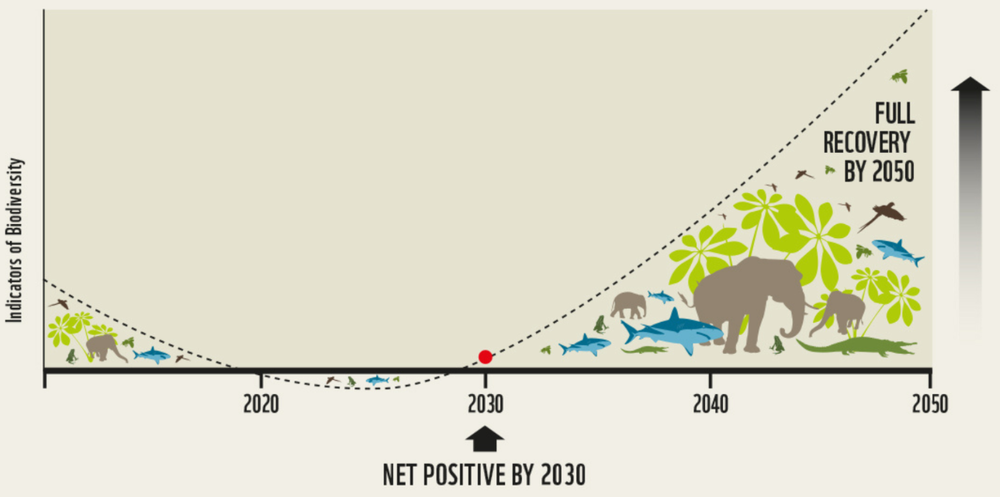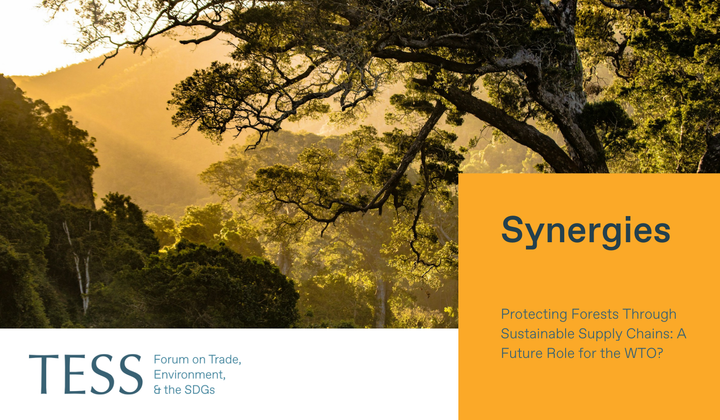There is an urgent need to mainstream biodiversity in international trade policies. The WTO has immense potential to strengthen inclusive policies for the advancement of nature-positive trade for the benefit of economies, nature, and people.
This article is part of a Synergies series on reviving multilateralism curated by TESS titled From Vision to Action on Trade and Sustainability at the WTO. Any views and opinions expressed are those of the author(s) and do not necessarily reflect those of TESS or any of its partner organizations or funders.
-----
Humanity is rapidly approaching its greatest challenge but also its greatest opportunity. Either we will let earth systems—from weather systems to entire ecosystems and ecoregions—reach tipping points and deeply destabilize under human pressures with terrifying consequences for our society, economy, and wellbeing. Or we will embrace a turning point in our relationship with nature. We are both in the middle of a dangerous ecological crisis and on the cusp of a green revolution. Multilateral trade and trade-related policies can play a pivotal role in supporting environmental sustainability for the future. The relevance of the nature and climate agendas in the trade arena is not just growing, but is devastatingly clear: nature underpins every aspect of our businesses, our financial systems, and our livelihoods.
The World Economic Forum found that $44 trillion of economic value generation—over half the world’s total GDP—is moderately or highly dependent on nature and its services and, as a result, exposed to risks from biodiversity loss and ecosystem degradation. It’s no surprise that businesses and intergovernmental trade bodies are paying particular attention to fighting climate change, addressing plastic pollution, and transitioning to a green economy.
So how can the World Trade Organization (WTO) and its members demonstrate leadership in approaching these environmental crises and the silent decline of nature and biodiversity?
The relevance of the nature and climate agendas in the trade arena is not just growing, but is devastatingly clear: nature underpins every aspect of our businesses, our financial systems, and our livelihoods.
A Nature-Positive Global Goal
In December 2022, the world came together to adopt at the UN Biodiversity Conference (COP15) an ambitious framework to halt and reverse nature loss, for the benefit of all people and the planet. This is no mean feat. Over 190 governments were negotiating late into the night to arrive at the final agreement, a demonstration of global alignment at the highest level.
The mission outlined in the Kunming-Montreal Global Biodiversity Framework codifies for the first time a global goal for nature, similarly to what the Paris Agreement did for climate: halt and reverse biodiversity loss by 2030, a nature-positive global goal. This is not just a slogan. It is an ambitious and disruptive measurable goal, indicating what all sectors in society should contribute to and be measured against: a nature-positive outcome, one where there is more nature at the end of the decade than at its start. Just as we have net-zero emissions and carbon-neutral for climate, we need net-positive biodiversity and nature-positive, for nature. Nature can recover, and fast, if given a chance.

The trajectory of nature positive by 2030
The nature-positive global goal drives a new and measurable ambition in governments, business, and society. It also drives the opportunity for links between biodiversity and other conventions, the UN Sustainable Development Goals, and particularly on climate, ocean, and land degradation.
Year on year, the climate, biodiversity, and pollution crises worsen. The latest data from the Copernicus Climate Change Centre shows that the world endured 12 consecutive months with global warming of 1.5°C above pre-industrial levels. The world has woken up to the crisis in plastic pollution, which continues to kill millions of wild animals every year and has entered the food we eat, water we drink, and air we breathe. Nature loss continues unabated. Yet action is flagging behind with the poorest and most vulnerable populations hit first and hardest.
All three crises are linked and, as such, should be addressed together. To deliver a swift transition to an equitable, nature-positive, and net-zero emissions future, the world must get behind joined-up action.
More Sustainable Trade Practices
Against this backdrop, there is an urgent need to mainstream biodiversity in international trade policies. The WTO has immense potential to strengthen inclusive policies for the advancement of nature-positive trade—for the benefit of economies, nature, and people—especially in the developing world. In simple words, nature-positive trade should be trade that incentivizes nature-positive practices in the production and consumption of all major commodities throughout the supply chain: from agricultural produce to fish, timber, and minerals. It could help halt and reverse biodiversity loss with tools such as lowering tariffs on relevant environmental goods and services, eliminating perverse subsidies, and reducing the complexity of environmental standards.
Nature-positive trade should be trade that incentivizes nature-positive practices in the production and consumption of all major commodities throughout the supply chain: from agricultural produce to fish, timber, and minerals.
Despite this potential, the Thirteenth WTO Ministerial Conference ended without agreement on the second phase of negotiations on fisheries subsidies that contribute to overcapacity and overfishing. Ministers also failed to agree on a roadmap to revive agricultural negotiations and on a permanent solution on subsidies granted through the purchase of food at administered price under public stockholding programmes for food security purposes. This comes as a disappointment against the backdrop of environmental momentum building seen at the WTO in recent years.
In 2020, a group of WTO members launched an initiative to identify opportunities for enhanced trade cooperation to contribute to efforts to reduce plastics pollution and promote the transition to more environmentally sustainable plastics trade, leading to the establishment of the Dialogue on Plastics Pollution (DPP). This is an example of constructive engagement in seeking to move trade to more sustainable practices. A set of members has also developed opportunities to consider the intersection of trade, environment, and sustainable development in the context of the Trade and Environmental Sustainability Structured Discussions (TESSD) and the Fossil Fuel Subsidy Reform (FFSR) initiative. Topics of discussion in these member-led initiatives include, among others, trade-related climate measures, promoting trade in environmental goods and services, trade and the transitions to a circular economy and circularity, and subsidies relevant to a low-carbon transition. At MC13, TESSD co-conveners released a statement and ministerial statements were issued by the DPP and FFSR initiative together with updated work plans as well as a series of outcome documents summarizing the work to date. This ambition needs to continue.
Shifting Towards Nature-Positive Trade
Key challenges lie ahead. Defining specific metrics to measure the loss or gain of nature will be vital to shift towards nature-positive trade. Aggregating this measurement globally will give an overall picture and allow us to work towards the 2030 global goal.
This is where the Nature Positive Initiative wants to offer its contribution. The diversity of highly credible organizations from the environmental, sustainable business, and standard-setting sector coupled with their technical knowledge and capability aims at driving alignment, convergence, and integration on the principles, definitions, frameworks, and metrics necessary to drive genuine and demonstrable nature-positive outcomes. Encouragingly, an increasing number of businesses, financial institutions, and organizations are joining the initiative.
Sustainability is essential to us all. We must work together to ensure that the vital resources nature offers are responsibly managed and maintained for future generations. Moving towards nature-positive trade is not just possible but necessary. To really embed sustainable practices in our society and economy we need every element of our complex and globalized economy to play its part. Trade is no exception and, in fact, a crucial component of building a safer and more just future for all.
-----
Marco Lambertini is Convenor of the Nature Positive Initiative. He was WWF International Director General (2014-2022) and Special Envoy (2023).
-----
Synergies by TESS is a blog dedicated to promoting inclusive policy dialogue at the intersection of trade, environment, and sustainable development, drawing on perspectives from a range of experts from around the globe. The editor is Fabrice Lehmann.
Disclaimer
Any views and opinions expressed on Synergies are those of the author(s) and do not necessarily reflect those of TESS or any of its partner organizations or funders.
License
All of the content on Synergies is licensed under a Creative Commons Attribution-NonCommercial-ShareAlike 4.0 International (CC BY-NC-SA 4.0)
license. This means you are welcome to adapt, copy, and share it on your platforms with attribution to the source and author(s), but not for commercial purposes. You must also share it under the same CC BY-NC-SA 4.0 license.
If you would like to reuse any material published here or if you have any other question related to Synergies, send an email to fabrice.lehmann@graduateinstitute.ch.




